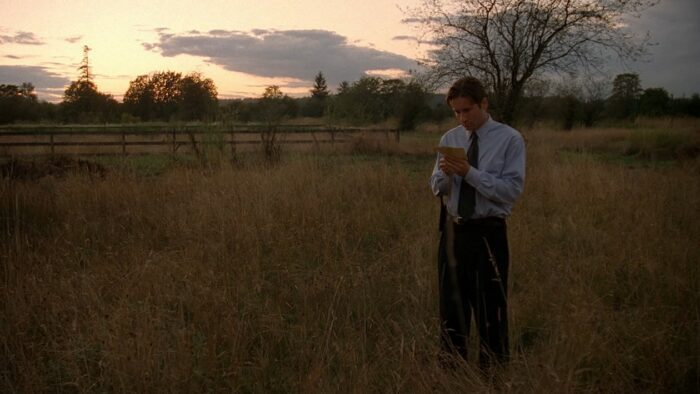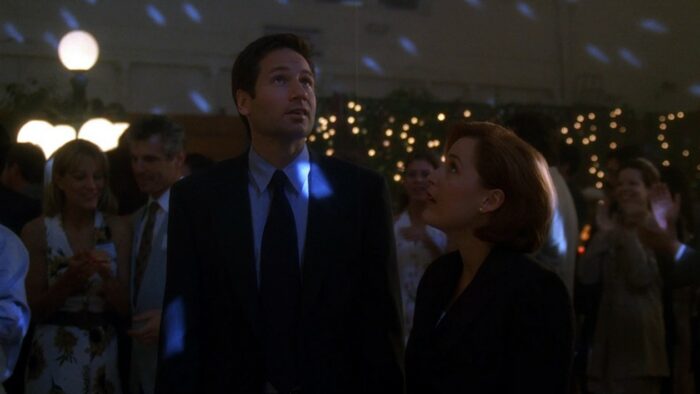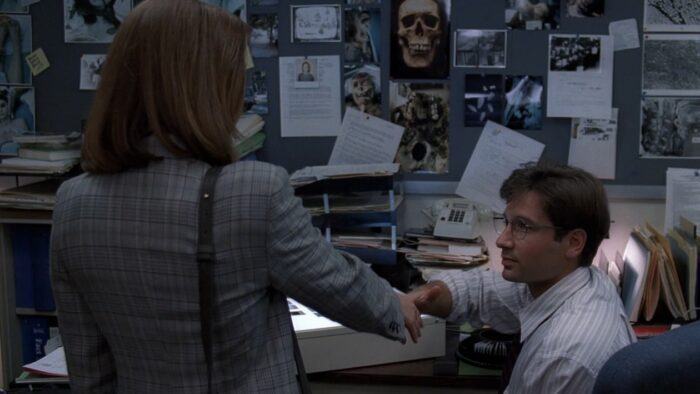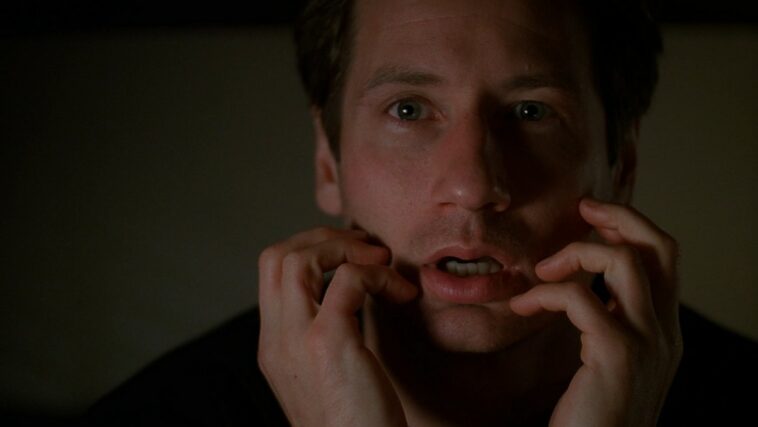A clickbait article about an X-Files reboot recently did the rounds on Twitter, and it had some fans reeling. Twitter user @KaryGetz wrote, “There’s no X Files without Mulder and Scully. Doing something without them is not understanding the essence of the show,” and the word “essence” stood out to me. Being part of the fandom means observing people who have clearly had radically different viewing experiences—many would say, for example, that the MSR is essential to The X-Files, while some would argue the opposite. Some people prefer the mythology episodes over the monsters of the week, while others skip over the Myth Arc entirely. Then there are those who are wholeheartedly committed to the Vancouver era (Seasons 1-5) claiming it was more X-Files-y than the LA era. Is it therefore possible to identify an objective essence?
Essentialism holds that things, including people and TV shows, have a particular set of characteristics that are necessary to their existence. For example if the essence of a door is that it opens, then something that does not open cannot be a door. In other words, essence precedes existence.

This idea manifests itself in The X-Files in a few ways, for example in immaterial souls, and the legitimisation of ghosts and reincarnation. There’s even an episode called ‘Essence’, where in the opening monologue Mulder wonders whether human souls can be found in DNA, and whether like DNA they can be replicated. I wonder what it would take to successfully replicate The X-Files—does the show itself have a soul, or an essence? In the revival seasons the show did its best to recreate a variety of episode types from the original run—there’s an evil technology episode, a cannibal cult episode, and a couple of quirky Darin Morgan comedies. And yet, something about it feels…off. It featured the proposed essence (Mulder and Scully). It was even filmed in Vancouver. But how many fans feel like it successfully captured the soul of the show that they love?
We use the language of essentialism to talk about fiction, and I wonder how this is affecting our experiences of our favourite shows. For example, fans will say things like, “‘The Rain King’ just isn’t The X-Files,” and, “Scully’s jealousy was out-of-character”. Darin Morgan expressed his concern that his more comedic style might not fit with where the show stood in Seasons 2 and 3: “I was always very conscious of having it still be an X-File” (Brian Lowry’s Trust No One). We throw around the term “X-Files Lite” to refer to some episodes of Seasons 6 (and later), in particular ‘Dreamland’ and ‘The Rain King’, implying that these episodes are “lite” on some ingredient that is fundamental to The X-Files. Again, it is as if there is an X-Files essence that an episode can have more or less of.

What is The X-Files?
If we were to write a definition of The X-Files, we might start with the title of the show. This is a show about X-Files. Not the X-Files as in the department of the FBI, because for certain periods of the show none of the protagonists were working in that department, and we wouldn’t like to exclude such classics as ‘Drive’ and ‘Triangle’ from our definition. What we mean is cases of paranormal phenomena, and typically that Mulder and Scully will investigate some gruesome deaths at the hands of a supernatural entity. Thus, we might end up with a definition like this: a science fiction cop show where FBI Agents uncover a global conspiracy and investigate paranormal phenomena.
Could you make a new TV show that meets this exact definition and call it a successful X-Files reboot? Probably not—we have circled back to @KaryGetz’s initial point that it wouldn’t be The X-Files without Mulder and Scully specifically.
Chris would never come over and say ‘put X in this story’ if it’s not essential to the story. The only people who have to be there are Mulder and Scully.
—John Shiban, Trust No One by Brian Lowry
In Trust No One it comes across that all the writers agreed that Chris Carter knew Mulder and Scully better than anyone. Howard Gordon called him “the touchstone”. So maybe the essence of The X-Files exists in the mind of Chris Carter.
However, the show that Carter set out to make centred on a purely platonic lead duo. He was adamant that The X-Files would not be about romance or sexual tension—as he is quoted in Lowry’s The Truth is Out There, “the relationship will supplant or subvert what’s going to make the show great, which is the pursuit of these cases”. Well, for better or worse, this did not remain the case. As AJ Black put it, “their romance, and the fruit of their relationship, (becomes) the mythology”; somewhere along the line the essence of the show, even as its creator saw it, changed.

For most of the show, the only thing that remains the same one episode to the next are the two lead actors. Certainly David Duchovny and Gillian Anderson and their famed chemistry receive a whole lot of credit for defining The X-Files. Carter had to fight to put Anderson in the show, but to him it was necessary. “When she came into the room, I just knew she was Scully” (The Truth is Out There). If Anderson has the “Scully essence” then it’s not absurd to suggest that Anderson and Duchovny together have the X-Files essence. Fans have said time and again, whenever another one of these reboot rumours surfaces, that they do not want The X-Files without their beloved lead actors (fully respectful of the fact that either might not wish to return).
The elephant in the room, then, is the fact that there were almost two full seasons of the show where Duchovny was absent. The characteristic of “being about Mulder and Scully” (or “starring Duchovny and Anderson”) is shared by most episodes of The X-Files, but if we were to suggest that only episodes that are about Mulder and Scully are allowed into the proverbial X-Files Episodes Club, then ‘Travelers’, ‘Unusual Suspects’, and most of Seasons 8 and 9 would be left at the door. Can a definition of The X-Files exclude something that was part of The X-Files? This seems as absurd to me as suggesting that a character could act out of character in the canon of work that they are a character of.
The Scully Essence
If I may follow that last train of thought for a moment and return to what I called the “Scully essence”…What is it that makes the character who appears in one episode the same as the character that appears in the next? The obvious answer might be that they’re played by the same actor, but this doesn’t track very far—for example, not all Nicholas Lea appearances in The X-Files are as Krycek, and not all Krycek appearances are actually Nicholas Lea. From a writer’s perspective, the essence of a character is usually their motive, the thing that they want but don’t have. For example, you couldn’t say that Mulder’s essence is believing in aliens because he doesn’t always believe in aliens but you could say that Mulder’s essence is his search for the truth in whatever form that takes. This is the connective tissue that binds all of Mulder’s appearances in the show together—crucially, this essence is only true for as long as Mulder’s behaviour on-screen actualises it.
There is one specific reason why I’m interested in the “Scully essence”. I am bothered by something that the fandom says about her: that her jealousy of Diana Fowley is “out of character”. Usually the blame for this falls on the writers. How could they suddenly forget who Scully is and how she behaves? I take issue with this, not because I particularly care about Fowley vs Scully discourse, but because this language is assuming that Scully is a person who exists outside of how the writers write her (note that I am sort of using “writers” as shorthand, because I know that Gillian Anderson and the directors had a big impact on how Scully behaves on screen). Once again, the fandom claims to have identified an essence—in this case the “Scully essence”—as if it exists objectively and apart from her behaviour in the canon. I would argue that she cannot act out of character, because her character is her actions and nothing else.

Existentialism
@CatherineGlins2: “People suggest other shows based on whatever genre they perceive X-Files to fall into, but that’s just not the draw for me. X-Files is the combination of everything that goes into it, and I just haven’t found anything that replicates that […]”.
If essence does precede existence, then how might this affect someone like Jackson Van De Kamp? Agent Scully’s destiny (if you want to call it that) to work for the FBI and meet Mulder arose from choices that she herself made—as she puts it, it was a “chance meeting”. Mulder and Agent Spender, meanwhile, inherited their part in the conspiracy from their parents. But to say that Jackson has this destiny in his DNA is to mean it in a much more real sense. Much of the latter mythology is powered by an anxiety over Jackson’s biological essence. If the show had ended on that final scene in ‘Existence’, we would have been left with the more poetic realisation that Jackson—at this point William—is the essence of Mulder and Scully’s love, alien DNA be damned. Perhaps it was a necessary product of a story about human experimentation, but it seems to me that the narrative places too much importance on how Jackson was conceived, and it is tragic that he doesn’t get to define his life by his own choices.
For that reason, among others, I am sceptical of essentialism, instead favouring the converse argument: existentialism (existence precedes essence). Sartre said that “a man is nothing but a series of enterprises”. I believe that a TV show is nothing but a series of episodes and a character is nothing but a series of on-screen actions.
It has been argued that the essence of The X-Files is not a person but a place, however I think that claiming “the Vancouver era” (Seasons 1-5) as sacred illustrates a flaw in essentialism. Of course, geography is only part of it, since Season 6 and 7 saw major internal changes too, with a shift in favour of the MSR, and radical developments to the Myth Arc. Nonetheless, the rain and the fog and the pine forests were crucial to establishing the show’s visual style, and it’s true that some of this was lost after moving to sunny Los Angeles. There was also the fact of crew changes, new writers, and a different pool of supporting actors. On the other hand, Glen Morgan, James Wong, and Howard Gordon were just as crucial (probably even more so) to establishing the tone of The X-Files as the city of Vancouver, and they departed from the writing staff as early as Season 3. The show was sort of permanently in transition between an old phase and a new one. Whether it be the writing staff, the cast, the location, or Mulder and Scully’s relationship status, nothing lasts forever. What this should tell you is that an objective essence of The X-Files was not discovered in Vancouver, it was manufactured by all of these fluctuating variables. Existence precedes essence.

Another reason to reject essentialism is that it might lead to beliefs such as “all episodes without MSR are boring” or “all episodes with MSR are saccharine”. There are people who love The X-Files but dislike the MSR and cannot reconcile the two, so claim that the seasons that put a spotlight on the MSR are not really The X-Files. On the subject of shipping, I would suggest that to some fans shipping Mulder and Scully is so intrinsic to being in the category of “X-Files Fan”, that to be no-Romo, or to ship one of the more fringe pairings (looking at you Scully/Skinner and Mulder/Krycek) is to seem a part of a completely different category.
In 1996, Vince Gilligan said, “the greater proportion of people watch the show and enjoy it but don’t ever post anything on the Internet,” (Trust No One) and now in 2022 I am wondering if this is still true. Being a part of the online fandom is a lot of fun, and I love that I’ve been able to connect with like-minded people, but it must be said that we do spend a lot of time arguing and defending our opinions. One major problem with assigning an X-Files essence is assuming that anyone else will agree with you.
In the show, ‘Essence’ precedes ‘Existence’, but perhaps in the fandom, existence must precede essence. Because the truth is, what makes an episode of The X-Files an episode of The X-Files is simply being an episode of The X-Files. Can we even call it a science fiction show when it so often strays to other genres? When you begin to pull on these strings it becomes abundantly clear that there is no simple way to categorise The X-Files. Maybe there’s not even a correct way, which would mean that we are using flawed language when we use phrases like “X-Files Lite”. Furthermore, what makes an X-Phile is believing that The X-Files rocks…and we might not have anything else in common.

